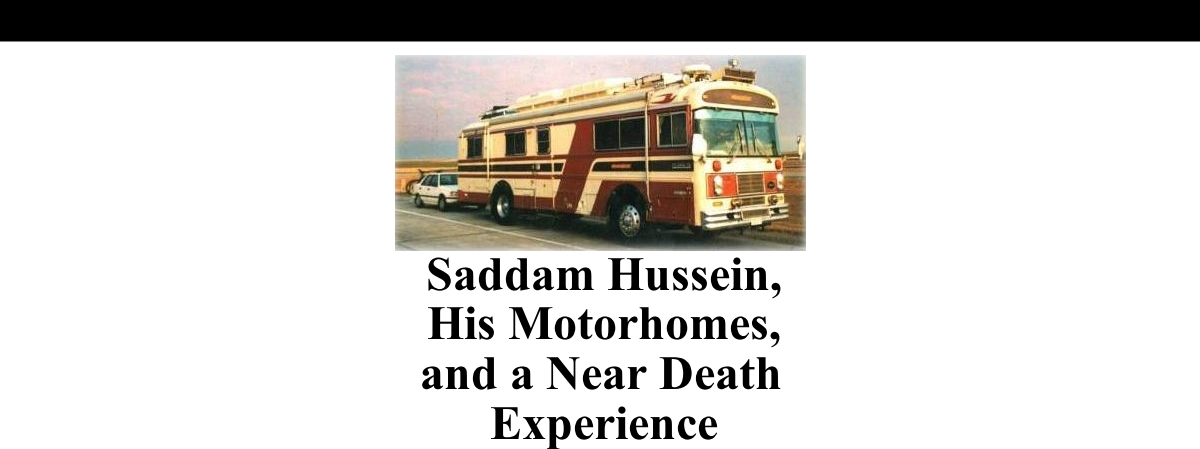

WASHINGTON, APRIL 23, 2003 AGENCE FRANCE PRESSE
Saddam Hussein was almost killed back in 1991 thanks to an American who shared the Iraqi leader's passion for motor home travel.
Saddam, whose post-war whereabouts are today unknown, was the prime target of a US bombing campaign to oust the Iraqi invaders from Kuwait.
His television appearances with his war cabinet were limited to tight shots of the small group in what appeared to be a small, nondescript room dominated by a table and chairs.
Watching one such meeting on television, David Winclair was hit by a bolt of recognition: it was the inside of a luxury Bluebird Wanderlodge 79 motor home, just like one that Winclair himself owned.
"During the Persian Gulf War, a Friday evening, I saw some propaganda Iraqi TV footage on an American television," Winclair told AFP from his home in Portland, Oregon, in the Pacific Northwest.
"They said, 'He is in a fortified command bunker in Basra.' I knew this was incorrect. Because of my familiarity, I recognized immediately the inside of a Wanderlodge and I knew for a fact that he had some.
"I have a 79 Wanderlodge," said Winclair. "Because of their limited production, people know things and talk, that this or that movie star owns one, like Tom Cruise. "It was known in the Wanderlodge community that several Arab leaders had them, especially that Hussein had 17 to 18 of them, similar to mine."
Winclair told the Pentagon what he had recognized, and a motor home in a convoy believed to be occupied by Saddam was targeted in the southeastern Iraqi desert near Basra, but the president narrowly escaped.
Winclair was rewarded for his efforts two years later with a letter dated May 24 1993 from Lt Col Ronald Sturmer, US Army Foreign Intelligence, which read in part: "When you saw these television pictures you recognized that the scenes were not in a bunker but were in fact in a large recreational vehicle.
"As a result of your astute observation and patriotism, this information was reported to US military forces in the Persian Gulf for its use," Sturmer went on. "Many thanks for your contribution to the Gulf War effort."
Winclair says the US military also promised him, in 1999, a five million dollar reward, along with a request for discretion. The reward promise was never put it writing.
A few years ago, handicapped after a series of multiple cardiac by-pass operations and sorely in need of cash, Winclair asked the US military, and vice President Dick Cheney, who was defense secretary during the Gulf war, to make good on the reward promise, but has gotten nowhere.
"Your request for compensation is not a valid claim," said a December 5 2001 letter he received from the US Army Claims Service, Office of the Judge Advocate General.
Asked about Winclair's claim, Col W. Patrick Lang (ret), who in 1991 headed the Middle East Section of the Defense Intelligence Agency, told AFP, "I don't think we would offer a reward like this. Intelligence business laws are pretty clear. Paying people for intelligence information on a one-time basis would be very exceptional. We believe this is a patriotic duty."
New York Lawyer Bunji Fromartz has been pressing Winclair's claim that he was promised five million dollars by Lt Col Joseph Barry Hughes, US Army deputy chief of staff for intelligence, but with nothing in writing to prove the five million dollar promise, he has made little headway.
In the meantime, according to his lawyer, Winclair is out of work, homeless handicapped.
All rights reserved. Copyright 2003 Agence France-Presse. Sections of the information displayed on this page (dispatches, photographs, logos) are protected by intellectual property rights owned by Agence France-Presse. As a consequence, you may not copy, reproduce, modify, transmit, publish, display or in any way commercially exploit any of the content of this section without the prior written consent of Agence France-Presse.
FOLLOW US